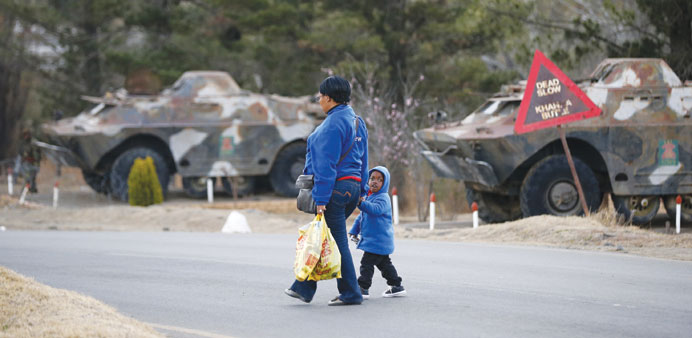A woman walks with a child past armed personnel carriers at the entrance of the army barracks in Maseru yesterday.
Reuters/AFP/DPA/Maseru
Lesotho’s Prime Minister Thomas Thabane has accused his country’s army of staging a coup against him and fled to neighbouring South Africa, which condemned the military’s action and called for a peaceful settlement.
Early morning gunfire was heard in Maseru, capital of the small southern African kingdom encircled by South Africa.
Army units occupied police headquarters and surrounded the prime minister’s residence, residents and diplomats said.
They later withdrew, sports minister and leader of the Basotho National Party, Thesele Maseribane told AFP.
“The (military) commander said he was looking for me, the prime minister and the deputy prime minister to take us to the king. In our country, that means a coup,” he said.
Hours after the army’s move, the capital was reported to be quiet but it was not immediately clear who was running the government of the mountainous state of 2mn people.
Thabane, who in June had dissolved parliament to avoid a no-confidence vote against him amid feuding in his two-year-old coalition government, said that he had crossed over to South Africa because he feared for his safety.
“There was clearly an effort to launch a coup,” Thabane told Reuters, saying he was at his daughter’s home in South Africa.
“We are taking concrete steps to nip it in the bud,” he added, saying that the regional Southern African Development Community (SADC) was addressing the situation.
South Africa, speaking on behalf of the SADC, condemned the actions of the Lesotho military, which it said “bear the hallmarks of a coup d’etat”.
It called on Lesotho’s army commander to order his units back to their barracks.
“Any unconstitutional change of government shall not be tolerated,” South African foreign ministry spokesman Clayson Monyela told a news briefing in Pretoria.
Coalition partners had accused Thabane of aloofness and of not consulting them.
Thabane told South African broadcaster eNCA yesterday that there was no infighting among the ruling coalition and that he did not intend to resign.
Earlier, giving its version of events, the Lesotho Defence Force denied attempting a coup against Thabane, saying that it had moved against police elements suspected of planning to arm a political faction, an army spokesman said.
“There is nothing like that (a coup), the situation has returned to normalcy ... the military has returned to their barracks,” Major Ntlele Ntoi told Reuters.
“There has never been and there will never be a coup in Lesotho perpetrated by the military,” he told South Africa’s ANN7 television news channel.
“The military embarked on an operation to disarm the police, who, according to the intelligence gathered by the military, were arranging to arm some of the political sides in Lesotho,” he said.
Ntoi added that the military “supports the democratically-elected government of the day”.
He said one soldier and four police had been injured during the army action.
At least one witness reported police officers being detained by soldiers.
Police officers locked up and left their headquarters after the military raid, a witness said.
Heavily armed security forces were driving police cars through the city in the afternoon, according to an AFP correspondent.
An AFP photographer was pursued and his camera smashed after taking pictures of soldiers.
A radio station was also put off the air. The unrest came a day after police banned an anti-government demonstration planned for tomorrow.
Diplomats in Maseru said that the Lesotho army was mostly loyal to Deputy Prime Minister Mothetjoa Metsing, who had vowed to form a new coalition that would oust Thabane.
The police force largely supported the prime minister, the sources said.
South Africa’s Monyela said no individual or body had claimed to have taken over the government.
“The situation is still unfolding,” he said, adding South Africa urged the coalition leaders to settle their differences peacefully.
The Commonwealth, most of whose member states are former British colonies, also condemned the reported coup.
“There is zero tolerance in the Commonwealth of any unconstitutional overthrow of an elected government,” Commonwealth Secretary General Kamalesh Sharma said in a statement sent to Reuters.
Thabane said that he had fired the Lesotho Defence Force commander, Lieutenant-General Kennedy Tlali Kamoli, replacing him with Brigadier Maaparankoe Mahao. But the army spokesman told Reuters that Kamoli was still in charge of the military.
Thabane said: “Commanders of armies are appointed by government, it is not up to them to say who is in control.”
He said he intended to return home, but did not specify when.
“I have been removed from control not by the people but by the armed forces, and that is illegal,” Thabane told the BBC.
He said he would return to Lesotho “as soon as I know I am not going to get killed”.
“That is something I will have to weigh,” he said. “I will not go back to Lesotho to get killed.”
Since independence from Britain in 1966, Lesotho has undergone a number of military coups.
In 1998 at least 58 locals and eight South African soldiers died and parts of Maseru were damaged during a political stand-off and subsequent fighting.
Besides textile exports and a slice of regional customs receipts, Lesotho’s other big earner is hydropower exported to South Africa from the massive mountain ranges that have made it a favourite of trivia fans as “the world’s highest country” – its lowest point is 1,380m (4,528 feet) above sea level.

